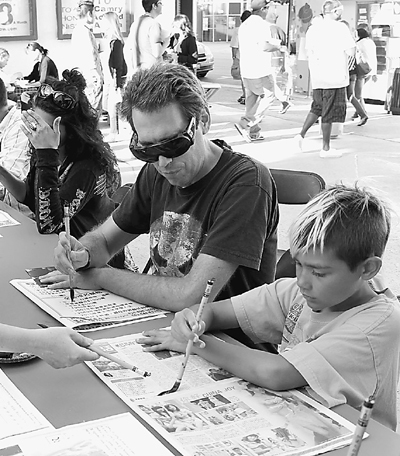Dr. Susan Jain, a resident of the U. S. city of San Francisco, developed a strong interest in the Chinese language when she discovered Chinese opera, which led her to pursue a doctorate on Asian theater performance.
|

A father and his son learn to write Chinese calligraphy in the Confucius Institute, University of California in Los Angeles under the guidance of teachers, on August 7, 2010. Activities are held in Chinatown of Los Angeles every Saturday in August, including cultural performances, lectures on Chinese culture, and Chinese food cooking show.
|
Today, Jain, who now speaks fluent Chinese, is helping share her passion for Chinese language and culture through the Confucius Institute, a global non-profit organization aimed at promoting Chinese language and culture through local institutes of higher education.
As the executive director of the Confucius Institute at the University of California, Los Angeles (UCLA), Jain helps develop programs to train Chinese teachers and promote understanding of Chinese culture.
"One of the things we're really successful at doing is trying to build local capacity," Jain told Xinhua in an interview on Monday.
The Confucius Institute at UCLA has used this local knowledge to help develop outreach programs aimed at best fitting the needs of its local demographics since it was first established in 2007. When basketball star Kobe Bryant first announced that he would be contributing funds to support Mandarin language education in inner city Los Angeles, it was the institute that suggested expanding the scope of the after-school program to include Wushu.
"We found out who (Bryant) was going to work with and suggested they not just teach Mandarin -- let's do Wushu," Jain said, noting that kids would be more engaged through an interactive activity like martial art as compared to an additional language course.
The Confucius Institute brought in noted Wushu master Hu Jian Qiang, who now lives in Los Angeles, and helped sponsor the first annual international Wushu tournament this past May.
The tournament drew more than 400 participants, including students involved in the after-school Wushu program led by Master Hu. "You had kids reciting 'yi, er, san' ('one, two, three' in Chinese) ... if you can hook them that way, you show them how this can be a part of their lives," said Jain, who described Chinese opera as her own personal hook.
While each Confucius Institute is responsible for developing their own focuses based on local needs, the entire global network of more than 280 institutions in nearly 90 countries is connected with the Beijing-based headquarters, the Directive Group for the External Promotion of the Chinese Language, or "Hanban" as known in China, which is an affiliate of China's Ministry of Education.
Jain, however, admits there is currently not a lot of exchange of ideas and information between the different institutes. "I think we should use this wonderful network to create programs that are multilateral," said Jain.
At UCLA, the four primary focus areas are primary education language programs, Eastern and Western medicine, translation for graduate students and social sciences, and arts and cultures.
As part of these efforts, the Confucius Institute at UCLA is working with the university's school of education to credential Chinese teachers.
"In a recent survey of current teachers at the school of education, we found 14 students who identified themselves as nearly fluent or fluent in Chinese. We want to help them add an additional credential for teaching Chinese," said Jain.
She also sees this as an additional opportunity for other foreign language programs, particularly those at UCLA.
"Seventy-five percent of (current) students at UCLA have at least one parent whose native language is not English. We want to tap this resource," said Jain.
Outside of the university, UCLA's Confucius Institute has been well-received by the community, according to Jain.
"One of the reasons is that when we were first established, we spent a lot of time talking to people. A lot of people on our campus have ties to China. We really wanted to build on the experiences of others and spent a lot of time letting people in our communities know that we wanted to be there as a resource and as a partner," Jain said.
Officials at San Francisco State University voiced similar goals, where the program's main offerings currently focus on working with local teachers in the San Francisco Bay Area in delivering language and culture events.
As one of the first four Confucius Institutes established in the United States, and the first one on the West Coast, San Francisco State University has seen steadily increasing interest.
"Our greatest challenge is to create enough Confucius Institute class resources to catch up with that interest," said Dr. Yenbo Wu, the university's director of international programs.
Beyond the language and culture learning aspects of the Confucius Institute, Jain also sees it as an opportunity to inspire students, particularly younger ones. "It's not just about learning Chinese. It really can open a door or change a life," she said.
At UCLA, the institute offers students in certain school districts the opportunity to visit China during their summer breaks, subsidized primarily by the "Hanban" with the exception of airplane tickets. Last year, the program brought 97 students to China, where most of the participants had never held a passport prior to their trips.
"Eighty percent of the kids who are going are either Latino or African-American and come from inner city neighborhoods," said Jain. "I strongly feel that we need to be globalizing our kids and show them that it's not just about our country. We're all connected."
(Xinhua News Agency August 11, 2010)
Go to Forum >>0 Comments